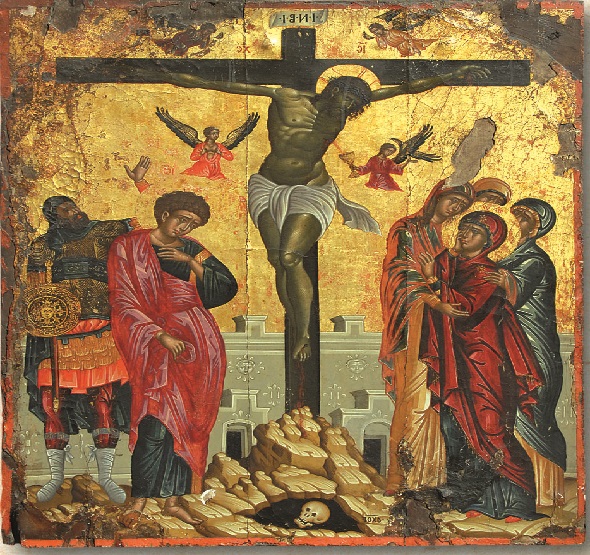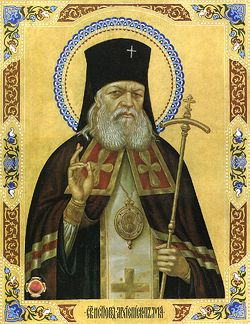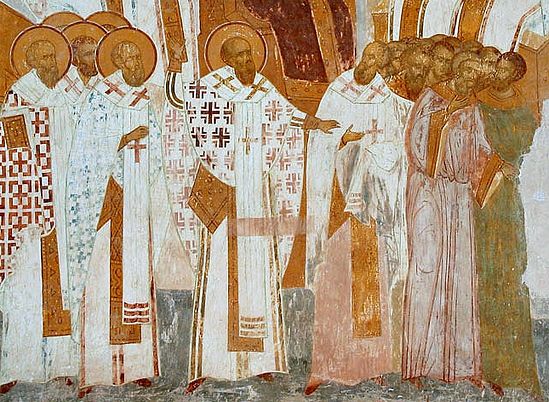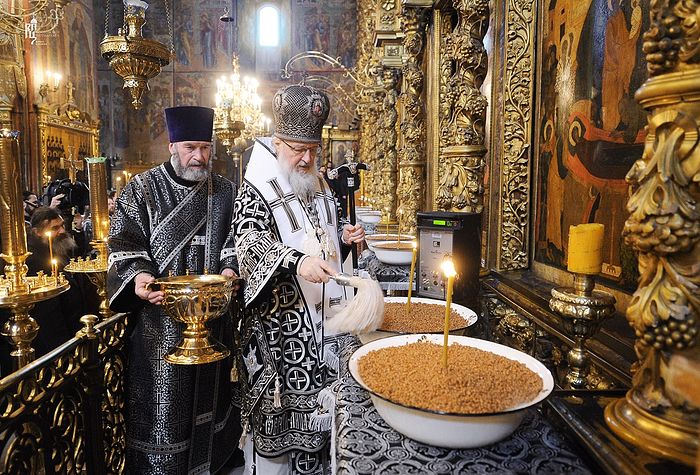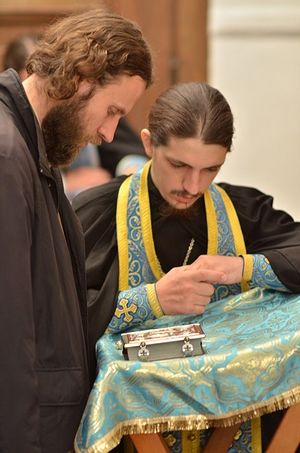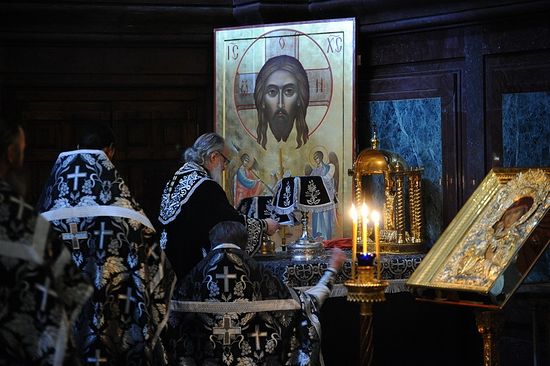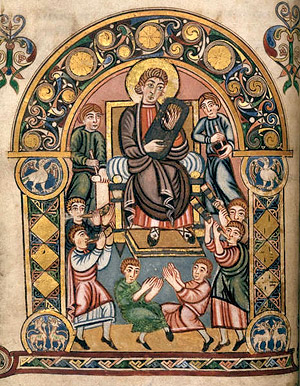INTRODUCTORY NOTE TO THE EPISTLES OF MATHETES TO DIOGNETUS
[a.d. 130.] The anonymous author of this Epistle gives himself the title (Mathetes) "a disciple1 of the Apostles," and I venture to adopt it as his name. It is about all we know of him, and it serves a useful end. I place his letter here, as a sequel to the Clementine Epistle, for several reasons, which I think scholars will approve: (1) It is full of the Pauline spirit, and exhales the same pure and primitive fragrance which is characteristic of Clement. (2) No theory as to its date very much conflicts with that which I adopt, and it is sustained by good authorities. (3) But, as a specimen of the persuasives against Gentilism which early Christians employed in their intercourse with friends who adhered to heathenism, it admirably illustrates the temper prescribed by St. Paul (2 Timothy 2: 24), and not less the peculiar social relations of converts to the Gospel with the more amiable and candid of their personal friends at this early period.
Mathetes was possibly a catechumen of St. Paul or of one of the apostle's associates. I assume that his correspondent was the tutor of M. Aurelius. Placed just here, it fills a lacuna in the series, and takes the place of the s1.v10.a2.w9, which is now relegated to its proper place with the works falsely ascribed to St. Clement.
Altogether, the Epistle is a gem of purest ray; and, while suggesting some difficulties as to interpretation and exposition, it is practically clear as to argument and intent. Mathetes is, perhaps, the first of the apologists.
The following is the original introductory notice of the learned editors and translators:-
The following interesting and eloquent Epistle is anonymous, and we have no clue whatever as to its author. For a considerable period after its publication in 1592, it was generally ascribed to Justin Martyr. In recent times Otto has inserted it among the works of that writer, but Semisch and others contend that it cannot possibly be his. In dealing with this question, we depend entirely upon the internal evidence, no statement as to the authorship of the Epistle having descended to us from antiquity. And it can scarcely be denied that the whole tone of the Epistle, as well as special passages which it contains, points to some other writer than Justin. Accordingly, critics are now for the most part agreed that it is not his, and that it must be ascribed to one who lived at a still earlier date in the history of the Church. Several internal arguments have been brought forward in favour of this opinion. Supposing chap. xi. to be genuine, it has been supported by the fact that the writer there styles himself "a disciple of the apostles." But there is great suspicion that the two concluding chapters are spurious; and even though admitted to be genuine, the expression quoted evidently admits of a different explanation from that which implies the writer's personal acquaintance with the apostles: it might, indeed, be adopted by one even at the present day. More weight is to be attached to those passages in which the writer speaks of Christianity as still being a new thing in the world. Expressions to this effect occur in several places (chap. i., ii., ix.), and seem to imply that the author lived very little, if at all, after the apostolic age. There is certainly nothing in the Epistle which is inconsistent with this opinion; and we may therefore believe, that in this beautiful composition we possess a genuine production of some apostolic man who lived not later than the beginning of the second century.
The names of Clement of Rome and of Apollos have both been suggested as those of the probable author. Such opinions, however, are pure fancies, which it is perhaps impossible to refute, but which rest on nothing more than conjecture. Nor can a single word be said as to the person named Diognetus, to whom the letter is addressed. We must be content to leave both points in hopeless obscurity, and simply accept the Epistle as written by an earnest and intelligent Christian to a sincere inquirer among the Gentiles, towards the close of the apostolic age.
It is much to be regretted that the text is often so very doubtful. Only three mss. of the Epistle, all probably exhibiting the same original text, are known to exist; and in not a few passages the readings are, in consequence, very defective and obscure. But notwithstanding this drawback, and the difficulty of representing the full force and elegance of the original, this Epistle, as now presented to the English reader, can hardly fail to excite both his deepest interest and admiration.
[N.B.-Interesting speculations concerning this precious work may be seen in Bunsen's Hippolytus and his Age, vol. i. p. 188. The learned do not seem convinced by this author, but I have adopted his suggestion as to Diognetus the tutor of M. Aurelius.]
Diognetus
(from: _Apostolic Fathers_ Lightfoot & Harmer, 1891 translation)
The Epistle TO Diognetus
CHAPTER 1
1:1 Since I see, most excellent Diognetus, that thou
art exceedingly anxious to understand the religion of
the Christians, and that thy enquiries respecting them
are distinctly and carefully made, as to what God they
trust and how they worship Him, that they all
disregard the world and despise death, and take no
account of those who are regarded as gods by the
Greeks, neither observe the superstition of the Jews,
and as to the nature of the affection which they
entertain one to another, and of this new development
or interest, which has entered into men's lives now
and not before: I gladly welcome this zeal in thee,
and I ask of God, Who supplieth both the speaking and
the hearing to us, that it may be granted to myself to
speak in such a way that thou mayest be made better by
the hearing, and to thee that thou mayest so listen
that I the speaker may not be disappointed.
CHAPTER 2
2:1 Come then, clear thyself of all the
prepossessions which occupy thy mind, and throw off
the habit which leadeth thee astray, and become a new
man, as it were, from the beginning, as one who would
listen to a new story, even as thou thyself didst
confess. See not only with thine eyes, but with thine
intellect also, of what substance or of what form they
chance to be whom ye call and regard as gods.
2:2 Is not one of them stone, like that which we
tread under foot, and another bronze, no better than
the vessels which are forged for our use, and another
wood, which has already become rotten, and another
silver, which needs a man to guard it lest it be
stolen, and another iron, which is corroded with rust,
and another earthenware, not a whit more comely than
that which is supplied for the most dishonourable
service?
2:3 Are not all these of perishable matter? Are they
not forged by iron and fire? Did not the sculptor make
one, and the brass-founder another, and the
silversmith another, and the potter another? Before
they were moulded into this shape by the crafts of
these several artificers, was it not possible for each
one of them to have been changed in form and made to
resemble these several utensils? Might not the vessels
which are now made out of the same material, if they
met with the same artificers, be made like unto such
as these?
2:4 Could not these things which are now worshipped
by you, by human hands again be made vessels like the
rest? Are not they all deaf and blind, are they not
soul-less, senseless, motionless? Do they not all rot
and decay?
2:5 These things ye call gods, to these ye are
slaves, these ye worship; and ye end by becoming
altogether like unto them.
2:6 Therefore ye hate the Christians, because they
do not consider these to be gods.
2:7 For do not ye yourselves, who now regard and
worship them, much more despise them? Do ye not much
rather mock and insult them, worshipping those that
are of stone and earthenware unguarded, but shutting
up those that are of silver and gold by night, and
setting guards over them by day, to prevent their
being stolen?
2:8 And as for the honours which ye think to offer
to them, if they are sensible of them, ye rather
punish them thereby, whereas, if they are insensible,
ye reproach them by propitiating them with the blood
and fat of victims.
2:9 Let one of yourselves undergo this treatment,
let him submit to these things being done to him. Nay,
not so much as a single individual will willingly
submit to such punishment, for he has sensibility and
reason; but a stone submits, because it is insensible.
Therefore ye convict his sensibility.
2:10 Well, I could say much besides concerning the
Christians not being enslaved to such gods as these;
but if any one should think what has been said
insufficient, I hold it superfluous to say more.
CHAPTER 3
3:1 In the next place, I fancy that thou art chiefly
anxious to hear about their not practising their
religion in the same way as the Jews.
3:2 The Jews then, so far as they abstain from the
mode of worship described above, do well in claiming
to reverence one God of the universe and to regard Him
as Master; but so far as they offer Him this worship
in methods similar to those already mentioned, they
are altogether at fault.
3:3 For whereas the Greeks, by offering these things
to senseless and deaf images, make an exhibition of
stupidity, the Jews considering that they are
presenting them to God, as if He were in need of them,
ought in all reason to count it folly and not
religious worship.
3:4 For He that made the heaven and the earth and
all things that are therein, and furnisheth us all
with what we need, cannot Himself need any of these
things which He Himself supplieth to them that imagine
they are giving them to Him.
3:5 But those who think to perform sacrifices to Him
with blood and fat and whole burnt offerings, and to
honour Him with such honours, seem to me in no way
different from those who show the same respect towards
deaf images; for the one class think fit to make
offerings to things unable to participate in the
honour, the other class to One Who is in need of
nothing.
CHAPTER 4
4:1 But again their scruples concerning meats, and
their superstition relating to the sabbath and the
vanity of their circumcision and the dissimulation of
their fasting and new moons, I do [not] suppose you
need to learn from me, are ridiculous and unworthy of
any consideration.
4:2 For of the things created by God for the use of
man to receive some as created well, but to decline
others as useless and superfluous, is not this
impious?
4:3 And again to lie against God, as if He forbad us
to do any good thing on the sabbath day, is not this
profane?
4:4 Again, to vaunt the mutilation of the flesh as a
token of election as though for this reason they were
particularly beloved by God, is not this ridiculous?
4:5 And to watch the stars and the moon and to keep
the observance of months and of days, and to
distinguish the arrangements of God and the changes of
the seasons according to their own impulses, making
some into festivals and others into times of mourning,
who would regard this as an exhibition of godliness
and not much more of folly?
4:6 That the Christians are right therefore in
holding aloof from the common silliness and error of
the Jews and from their excessive fussiness and pride,
I consider that thou hast been sufficiently
instructed; but as regards the mystery of their own
religion, expect not that thou canst be instructed by
man.
CHAPTER 5
5:1 For Christians are not distinguished from the
rest of mankind either in locality or in speech or in
customs.
5:2 For they dwell not somewhere in cities of their
own, neither do they use some different language, nor
practise an extraordinary kind of life.
5:3 Nor again do they possess any invention
discovered by any intelligence or study of ingenious
men, nor are they masters of any human dogma as some
are.
5:4 But while they dwell in cities of Greeks and
barbarians as the lot of each is cast, and follow the
native customs in dress and food and the other
arrangements of life, yet the constitution of their
own citizenship, which they set forth, is marvellous,
and confessedly contradicts expectation.
5:5 They dwell in their own countries, but only as
sojourners; they bear their share in all things as
citizens, and they endure all hardships as strangers.
Every foreign country is a fatherland to them, and
every fatherland is foreign.
5:6 They marry like all other men and they beget
children; but they do not cast away their offspring.
5:7 They have their meals in common, but not their
wives.
5:8 They find themselves in the flesh, and yet they
live not after the flesh.
5:9 Their existence is on earth, but their
citizenship is in heaven.
5:10 They obey the established laws, and they
surpass the laws in their own lives.
5:11 They love all men, and they are persecuted by
all.
5:12 They are ignored, and yet they are condemned.
They are put to death, and yet they are endued with
life.
5:13 They are in beggary, and yet they make many
rich. They are in want of all things, and yet they
abound in all things.
5:14 They are dishonoured, and yet they are
glorified in their dishonour. They are evil spoken of,
and yet they are vindicated.
5:15 They are reviled, and they bless; they are
insulted, and they respect.
5:16 Doing good they are punished as evil-doers;
being punished they rejoice, as if they were thereby
quickened by life.
5:17 War is waged against them as aliens by the
Jews, and persecution is carried on against them by
the Greeks, and yet those that hate them cannot tell
the reason of their hostility.
CHAPTER 6
6:1 In a word, what the soul is in a body, this the
Christians are in the world.
6:2 The soul is spread through all the members of
the body, and Christians through the divers cities of
the world.
6:3 The soul hath its abode in the body, and yet it
is not of the body. So Christians have their abode in
the world, and yet they are not of the world.
6:4 The soul which is invisible is guarded in the
body which is visible: so Christians are recognised as
being in the world, and yet their religion remaineth
invisible.
6:5 The flesh hateth the soul and wageth war with
it, though it receiveth no wrong, because it is
forbidden to indulge in pleasures; so the world hateth
Christians, though it receiveth no wrong from them,
because they set themselves against its pleasures.
6:6 The soul loveth the flesh which hateth it, and
the members: so Christians love those that hate them.
6:7 The soul is enclosed in the body, and yet itself
holdeth the body together; so Christians are kept in
the world as in a prison-house, and yet they
themselves hold the world together.
6:8 The soul though itself immortal dwelleth in a
mortal tabernacle; so Christians sojourn amidst
perishable things, while they look for the
imperishability which is in the heavens.
6:9 The soul when hardly treated in the matter of
meats and drinks is improved; and so Christians when
punished increase more and more daily.
6:10 So great is the office for which God hath
appointed them, and which it is not lawful for them to
decline.
CHAPTER 7
7:1 For it is no earthly discovery, as I said, which
was committed to them, neither do they care to guard
so carefully any mortal invention, nor have they
entrusted to them the dispensation of human mysteries.
7:2 But truly the Almighty Creator of the Universe,
the Invisible God Himself from heaven planted among
men the truth and the holy teaching which surpasseth
the wit of man, and fixed it firmly in their hearts,
not as any man might imagine, by sending (to mankind)
a subaltern, or angel, or ruler, or one of those that
direct the affairs of earth, or one of those who have
been entrusted with the dispensations in heaven, but
the very Artificer and Creator of the Universe
Himself, by Whom He made the heavens, by Whom He
enclosed the sea in its proper bounds, Whose mysteries
all the elements faithfully observe, from Whom [the
sun] hath received even the measure of the courses of
the day to keep them, Whom the moon obeys as He bids
her shine by night, Whom the stars obey as they follow
the course of the moon, by Whom all things are ordered
and bounded and placed in subjection, the heavens and
the things that are in the heavens, the earth and the
things that are in the earth, the sea and the things
that are in the sea, fire, air, abyss, the things that
are in the heights, the things that are in the depths,
the things that are between the two. Him He sent unto
them.
2:3 Was He sent, think you, as any man might
suppose, to establish a sovereignty, to inspire fear
and terror?
2:4 Not so. But in gentleness [and] meekness has He
sent Him, as a king might send his son who is a king.
He sent Him, as sending God; He sent Him, as [a man]
unto men; He sent Him, as Saviour, as using
persuasion, not force: for force is no attribute of
God.
2:5 He sent Him, as summoning, not as persecuting;
He sent Him, as loving, not as judging.
2:6 For He will send Him in judgment, and who shall
endure His presence? ...
2:7 [Dost thou not see] them thrown to wild beasts
that so they may deny the Lord, and yet not overcome?
2:8 Dost thou not see that the more of them are
punished, just so many others abound?
2:9 These look not like the works of a man; they are
the power of God; they are proofs of His presence.
CHAPTER 8
8:1 For what man at all had any knowledge what God
was, before He came?
8:2 Or dost thou accept the empty and nonsensical
statements of those pretentious philosophers: of whom
some said that God was fire (they call that God,
whereunto they themselves shall go), and others water,
and others some other of the elements which were
created by God?
8:3 And yet if any of these statements is worthy of
acceptance, any one other created thing might just as
well be made out to be God.
8:4 Nay, all this is the quackery and deceit of the
magicians;
8:5 and no man has either seen or recognised Him,
but He revealed Himself.
8:6 And He revealed (Himself) by faith, whereby
alone it is given to see God.
8:7 For God, the Master and Creator of the Universe,
Who made all things and arranged them in order, was
found to be not only friendly to men, but also long-
suffering.
8:8 And such indeed He was always, and is, and will
be, kindly and good and dispassionate and true, and He
alone is good.
8:9 And having conceived a great and unutterable
scheme He communicated it to His Son alone.
8:10 For so long as He kept and guarded His wise
design as a mystery, He seemed to neglect us and to be
careless about us.
8:11 But when He revealed it through His beloved
Son, and manifested the purpose which He had prepared
from the beginning, He gave us all these gifts at
once, participation in His benefits, and sight and
understanding of (mysteries) which none of us ever
would have expected.
CHAPTER 9
9:1 Having thus planned everything already in His
mind with His Son, He permitted us during the former
time to be borne along by disorderly impulses as we
desired, led astray by pleasures and lusts, not at all
because He took delight in our sins, but because He
bore with us, not because He approved of the past
season of iniquity, but because He was creating the
present season of righteousness, that, being convicted
in the past time by our own deeds as unworthy of life,
we might now be made deserving by the goodness of God,
and having made clear our inability to enter into the
kingdom of God of ourselves, might be enabled by the
ability of God.
9:2 And when our iniquity had been fully
accomplished, and it had been made perfectly manifest
that punishment and death were expected as its
recompense, and the season came which God had
ordained, when henceforth He should manifest His
goodness and power (O the exceeding great kindness and
love of God), He hated us not, neither rejected us,
nor bore us malice, but was long-suffering and
patient, and in pity for us took upon Himself our
sins, and Himself parted with His own Son as a ransom
for us, the holy for the lawless, the guileless for
the evil, _the just for the unjust,_ the incorruptible
for the corruptible, the immortal for the mortal.
9:3 For what else but His righteousness would have
covered our sins?
9:4 In whom was it possible for us lawless and
ungodly men to have been justified, save only in the
Son of God?
9:5 O the sweet exchange, O the inscrutable
creation, O the unexpected benefits; that the iniquity
of many should be concealed in One Righteous Man, and
the righteousness of One should justify many that are
iniquitous!
9:6 Having then in the former time demonstrated the
inability of our nature to obtain life, and having now
revealed a Saviour able to save even creatures which
have no ability, He willed that for both reasons we
should believe in His goodness and should regard Him
as nurse, father, teacher, counsellor, physician,
mind, light, honour, glory, strength and life.
CHAPTER 10
10:1 This faith if thou also desirest, apprehend
first full knowledge of the Father.
10:2 _For God loved_ men for whose sake He made the
world, to whom He subjected all things that are in the
earth, to whom He gave reason and mind, whom alone He
permitted to look up to heaven, whom He created after
His own image, to whom _He sent His only begotten
Son,_ to whom He promised the kingdom which is in
heaven, and will give it to those that have loved Him.
10:3 And when thou hast attained to this full
knowledge, with what joy thinkest thou that thou wilt
be filled, or how wilt thou love Him that so loved
thee before?
10:4 And loving Him thou wilt be an imitator of His
goodness. And marvel not that a man can be an imitator
of God. He can, if God willeth it.
10:5 For happiness consisteth not in lordship over
one's neighbours, nor in desiring to have more than
weaker men, nor in possessing wealth and using force
to inferiors; neither can any one imitate God in these
matters; nay, these lie outside His greatness.
10:6 But whosoever taketh upon himself the burden of
his neighbour, whosoever desireth to benefit one that
is worse off in that in which he himself is superior,
whosoever by supplying to those that are in want
possessions which he received from God becomes a God
to those who receive them from him, he is an imitator
of God.
10:7 Then, though thou art placed on earth, thou
shalt behold that God liveth in heaven; then shalt
thou begin to declare the mysteries of God; then shalt
thou both love and admire those that are punished
because they will not deny God; then shalt thou
condemn the deceit and error of the world; when thou
shalt perceive the true life which is in heaven, when
thou shalt despise the apparent death which is here on
earth, when thou shalt fear the real death, which is
reserved for those that shall be condemned to the
eternal fire that shall punish those delivered over to
it unto the end.
10:8 Then shalt thou admire those who endure for
righteousness' sake the fire that is for a season, and
shalt count them blessed when thou perceivest that
fire ...
* * * * * *
CHAPTER 11
11:1 Mine are no strange discourses nor perverse
questionings, but having been a disciple of Apostles I
come forward as a teacher of the Gentiles, ministering
worthily to them, as they present themselves disciples
of the truth, the lessons which have been handed down.
11:2 For who that has been rightly taught and has
entered into friendship with the Word does not seek to
learn distinctly the lessons revealed openly by the
Word to the disciples; to whom the Word appeared and
declared them, speaking plainly, not perceived by the
unbelieving, but relating them to disciples who being
reckoned faithful by Him were taught the mysteries of
the Father?
11:3 For which cause He sent forth the Word, that He
might appear unto the world, Who being dishonoured by
the people, and preached by the Apostles, was believed
in by the Gentiles.
11:4 This Word, Who was from the beginning, Who
appeared as new and yet was proved to be old, and is
engendered always young in the hearts of saints,
11:5 He, I say, Who is eternal, Who to-day was
accounted a Son, through Whom the Church is enriched
and grace is unfolded and multiplied among the saints,
grace which confers understanding, which reveals
mysteries, which announces seasons, which rejoices
over the faithful, which is bestowed upon those who
seek her, even those by whom the pledges of faith are
not broken, nor the boundaries of the fathers
overstepped.
11:6 Whereupon the fear of the law is sung, and the
grace of the prophets is recognised, and the faith of
the gospels is established, and the tradition of the
apostles is preserved, and the joy of the Church
exults.
11:7 If thou grieve not this grace, thou shalt
understand the discourses which the Word holds by the
mouth of those whom He desires when He wishes.
11:8 For in all things, that by the will of the
commanding Word we were moved to utter with much
pains, we become sharers with you, through love of the
things revealed unto us.
CHAPTER 12
12:1 Confronted with these truths and listening to
them with attention, ye shall know how much God
bestoweth on those that love (Him) rightly, who become
a Paradise of delight, a tree bearing all manner of
fruits and flourishing, growing up in themselves and
adorned with various fruits.
12:2 For in this garden a tree of knowledge and a
tree of life hath been planted; yet the tree of
knowledge does not kill, but disobedience kills;
12:3 for the scriptures state clearly how God from
the beginning planted a tree [of knowledge and a tree]
of life in the midst of Paradise, revealing life
through knowledge; and because our first parents used
it not genuinely they were made naked by the deceit of
the serpent.
12:4 For neither is there life without knowledge,
nor sound knowledge without true life; therefore the
one (tree) is planted near the other.
12:5 Discerning the force of this and blaming the
knowledge which is exercised apart from the truth of
the injunction which leads to life, the apostle says,
_Knowledge puffeth up, but charity edifieth._
12:6 For the man who supposes that he knows anything
without the true knowledge which is testified by the
life, is ignorant, he is deceived by the serpent,
because he loved not life; whereas he who with fear
recognises and desires life plants in hope expecting
fruit.
12:7 Let your heart be knowledge, and your life true
reason, duly comprehended.
12:8 Whereof if thou bear the tree and pluck the
fruit, thou shalt ever gather the harvest which God
looks for, which serpent toucheth not, nor deceit
infecteth, neither is Eve corrupted, but is believed
on as a virgin,
12:9 and salvation is set forth, and the apostles
are filled with understanding, and the passover of the
Lord goes forward, and the congregations are gathered
together, and [all things] are arranged in order, and
as He teacheth the saints the Word is gladdened,
through Whom the Father is glorified, to Whom be glory
for ever and ever. Amen.
The Christian Life in the Epistle to Diognetus
Joel Stephen Williams
The Epistle to Diognetus has been called "the noblest of early Christian writings" by J. B. Lightfoot. Johannes Quasten said it "deserves to rank among the most brilliant and beautiful works of Christian Greek literature. The writer is a master of rhetoric, his sentence structure is full of charm....The content reveals a man of fervent faith and wide knowledge, a mind thoroughly imbued with the principles of Christianity" (Patrology, I, 251-52). Philip Schaff calls it that "short but precious document" and says the unknown author "must be ranked with the `great unknown' authors of Job and the Epistle to the Hebrews, who are known only to God" (History of the Christian Church, II, 699-700).
It is included among the works commonly known as the apostolic fathers, but it is different from the rest of those writings. The apostolic fathers were written to Christians, but the Epistle to Diognetus was written to and for outsiders. It is an apology, that is, a defense of the Christian faith, and it belongs among the Christian apologists more than among the apostolic fathers.
The Epistle to Diognetus was written to a high-ranking pagan, Diognetus. Several theories have been advanced as to who the author of the epistle was and who Diognetus was, but nothing is certain on either question. The date of the Epistle to Diognetus is probably in the mid-to-late second or very early third century. The only known manuscript of this work was lost in 1870 during the Franco-Prussian War when the library of Strasbourg burned.
The purpose of this article is to survey what the Epistle to Diognetus says about Christian ethics and the Christian life. The Christian life is a "way of life" (epitedeuma, BAGD, 302) which has come into the world from God (1.1). It is distinct from paganism and Judaism.
The author of the Epistle to Diognetus restates the traditional arguments against idolatry, reminding Diognetus that idols are made by the hands of man and are not real gods (2.1-10). An idol worshipper, rather than being elevated, becomes no better than the idols (2.5).
Next the author distinguishes Christianity from Judaism, especially a ritualistic, legalistic type of Judaism (3.1-4.6). Externals such as keeping the Sabbath, circumcision, or fastidiousness over ceremonies are not examples of "godliness" (4.5; theosebeia, "reverence for God, piety, religion," BAGD, 358; cf. 1.1; 6.4). What the author does not admit is that a pure ethic, such as in found in the prophets of the Old Testament, is quite compatible with a Christian ethic.
What distinguishes the Christian way of life is not something external, but something spiritual. The explanation in the Epistle of Diognetus of the uniqueness of the Christian life is so beautiful that it deserves to be quoted at length:
"Christians are not distinguished from the rest of humanity by country, language, or custom. For nowhere do they live in cities of their own, nor do they speak some unusual dialect, nor do they practice an eccentric lifestyle....While they live in both Greek and barbarian cities, as each one's lot was cast, and follow the local customs in dress and food and other aspects of life, at the same time they demonstrate the remarkable and admittedly unusual character of their own citizenship.
"They live in their own countries, but only as aliens; they participate in everything as citizens, and endure everything as foreigners. Every foreign country is their fatherland, and every fatherland is foreign. They marry like everyone else, and have children, but they do not expose their offspring. They share their food but not their wives. They are `in the flesh,' but do not live `according to the flesh.' They live on earth, but their citizenship is in heaven. They obey the established laws; indeed in their private lives they transcend the laws.
"They love everyone, and by everyone they are persecuted. They are unknown, yet they are condemned; they are put to death, yet they are brought to life. They are poor, yet they make many rich; they are in need of everything, yet they abound in everything. They are dishonored, yet they are glorified in their dishonor; they are slandered, yet they are vindicated. They are cursed, yet they bless; they are insulted, yet they offer respect. When they do good, they are punished as evildoers; when they are punished, they rejoice as though brought to life....Those who hate them are unable to give a reason for their hostility" (5.1-17).
The Epistle to Diognetus then compares the relationship of the church to the world with that of the soul to the body.
"In a word, what the soul is to the body, Christians are to the world. The soul is dispersed through all the members of the body, and Christians throughout the cities of the world. The soul dwells in the body, but is not of the body; likewise Christians dwell in the world, but are not of the world. The soul, which is invisible, is confined in the body, which is visible, in the same way, Christians are recognized as being in the world, and yet their religion remains invisible.
"The flesh hates the soul and wages war against it, even though it has suffered no wrong, because it is hindered from indulging in its pleasures, so also the world hates the Christians, even though it has suffered no wrong, because they set themselves against its pleasures. The soul loves the flesh that hates it, and its members, and Christians love those who hate them.
"The soul is enclosed in the body, but it holds the body together; and though Christians are detained, in the world as if in a prison, they in fact hold the world together. The soul, which is immortal, lives in a mortal dwelling; similarly Christians live as strangers amidst perishable things, while waiting for the imperishable in heaven....Such is the important position to which God has appointed them" (6.1-9).
This marvelous religion is the "truth" and comes from the "omnipotent Creator of all, the invisible God himself" as he has revealed himself to man, especially through his Son Jesus Christ (7.1-8.11; 11.1-8). When people lead "undisciplined" lives ruled by "pleasures and lusts," God, in his patience, uses these to show to us "our inability to enter the kingdom of God on our own" and "the powerlessness of our nature to obtain life" (9.1, 5). Then God's goodness makes us worthy through the atonement of Christ: "A ransom for us, the holy one for the lawless, the guiltless for the guilty, `the just for the unjust,' the incorruptible for the corruptible, the immortal for the mortal. For what else but his righteousness could have covered our sins?" (9.2-3).
According to the Epistle to Diognetus, then, the Christian life is a life of love and faith which is lived in response to the saving grace of God (9.5-10.3). "By loving him you will be an imitator of his goodness" (10.4). Only a few specifics are mentioned which give definition to the Christian life. Christians have a heartfelt love for one another (1.1). They love their neighbor and help those in need (5.11; 10.5-6). They even love their enemies (6.6). They are concerned with heavenly life, and they disregard the world and its pleasures (1.1; 6.5; 10.7). They are pure in regard to sexual relations (5.7). They do not live "according to the flesh" (5.8). They are obedient citizens (5.10). They do not fear physical death, but do fear the real death of eternal fire (10.7).
The Epistle to Diognetus presents a balanced approach to a Christian ethic. The pattern of what we should be comes from God. Goodness is defined by God's very nature, and we should be imitators of God. Due to Christ and his atonement we are enabled to become worthy before God. Our service to God is rendered, not through worshipping idols of wood or stone or through an empty ceremonialism, but by loving God, our neighbor, and even our enemies. Finally, to use an often repeated phrase, the church is in the world but not of the world.

